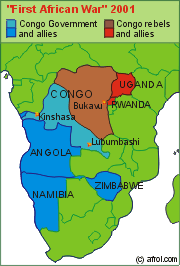|
afrol News, 21 April - As documentation of the looting of resources by foreign troops in Congo Kinshasa (DRC) is mounting, so is the evidence that civilians are gravely affected by this illegal resource exploitation. Human rights group now call on the international community to stop human rights abuses committed by the troops of Rwanda, Burundi, Uganda, Namibia, Zimbabwe and Angola. The US based monitoring group Human Rights Watch yesterday urged the United Nations Security Council to "take action against the looting of resources by foreign troops in the Democratic Republic of Congo and address the devastating human rights abuses being committed by the same troops." The group also called for the UN to establish a Commission of Experts to investigate and determine responsibility for grave violations of human rights and humanitarian law in Congo Kinshasa by all sides. - While Ugandan commanders were plundering gold, looting timber, exporting coffee, and controlling illicit trade monopolies in the Ituri district, their troops were killing and otherwise abusing the local population, said Alison Des Forges, Senior Advisor at the Africa Division of Human Rights Watch. "Absent international pressure, the situation can only get worse." On 16 April, a UN panel of experts on resource exploitation in the DRC published a report concluding that the governments of Uganda, Rwanda, and Burundi, whose troops occupy parts of eastern DRC, are profiting from the conflict by looting gold and other precious minerals, diamonds, timber, elephant tusks and tax revenues. The report also finds that those foreign forces allied with the Congolese government - Zimbabwe, Angola, and Namibia - are also profiting from the conflict. - The panel of experts is certainly right in concluding that 'the only loser in this huge business venture is the Congolese people, said DesForges. The illegal exploitation of resources has also exacerbated the suffering of the population in the areas of the Kivu provinces occupied by Rwanda and Burundi. The U.N. panel charges that Rwanda has used prisoners from its jails to mine resources in eastern DRC, a practice on which Human Rights Watch has also received testimonies. Human Rights Watch is still investigating but has not published a report on this specific issue, as may be inferred from the panel's comment. Human Rights Watch called on the Security Council to extend the mandate of the panel on the illegal exploitation of resources to allow it to conduct follow-up investigations and to complement its investigations on resource exploitation by governments allied with the Congolese government.
The UN Security Council's report also mentioned that Namibian authorities had "informed them" of a joint venture involving the Namibia Defence Force (NDF) front company and unnamed companies from the United States and Congo Kinshasa. However, "the Panel has not found substantial evidence that Angola and Namibia have signed commercial deals in the nature of 'arms and support for natural resources'," the report said. Zimbabwe is involved in a joint venture company with the Congolese government to mine diamonds in the mineral-rich Kasai province. Apart from diamond mining, there are also Zimbabweans in the retail business in the region, according to the Zimbabwe Independent. There have recently been reports of tension and strong anti-Zimbabwe sentiments in Kasai. Locals are complaining they are not benefiting from the exploitation of resources in their region and Zimbabwean troops in the province have been used against protesters. The UN experts in their report said the military expenditure of the countries involved in the DRC war "far outweigh the supposed money allocated for such expense," further enhancing speculations that the real winners are high government officials in the countries involved. "The conflict in the DRC ... has created a 'win-win' situation for all belligerents," the report concludes. Both Namibian President Sam Nujoma and Zimbabwean President Robert Mugabe have been criticised by the local press and opposition for their alleged personal involvement in resource exploitation in Congo Kinshasa. Neither Zimbabwe nor Namibia has a common border with Congo Kinshasa or faces direct security risks due to the conflict in the Great Lakes region. Sources: Based on Human
Rights Watch, UN, The Namibian and Zimbabwe Independent
|
front page
| news
| countries
| archive
| currencies
| news alerts login
| about afrol News
| contact
| advertise
| español
©
afrol News.
Reproducing or buying afrol News' articles.
You can contact us at mail@afrol.com

 While Rwandan, Ugandan and Burundi troops so far have been pinpointed as looting Congolese resources, evidence against especially Namibian and Zimbabwean troops are growing. Highest government officials in both allied countries seem deeply involved in the resource exploitation, which is seen as one of the few plausible explanations of their military involvement in Congo Kinshasa.
While Rwandan, Ugandan and Burundi troops so far have been pinpointed as looting Congolese resources, evidence against especially Namibian and Zimbabwean troops are growing. Highest government officials in both allied countries seem deeply involved in the resource exploitation, which is seen as one of the few plausible explanations of their military involvement in Congo Kinshasa.